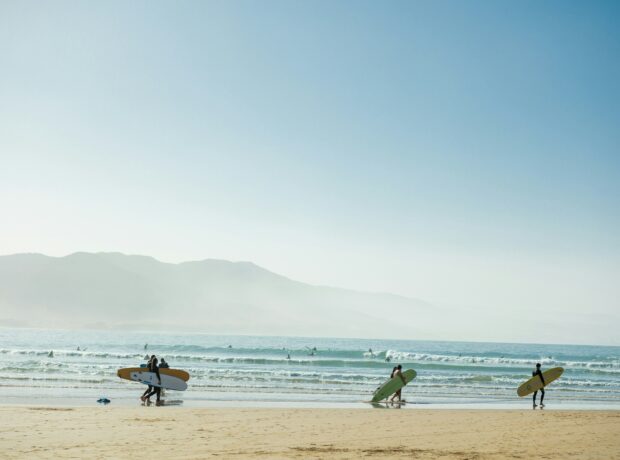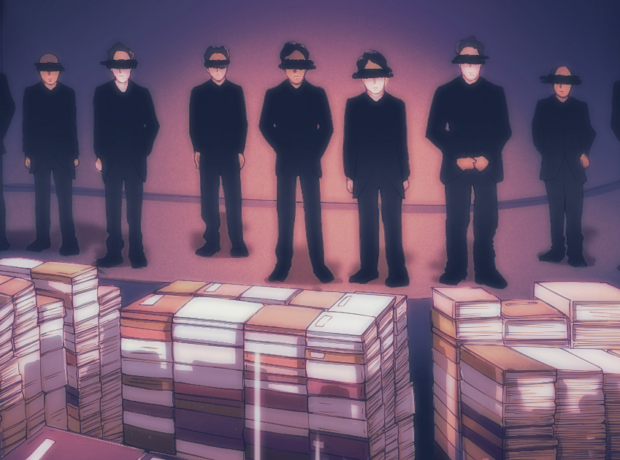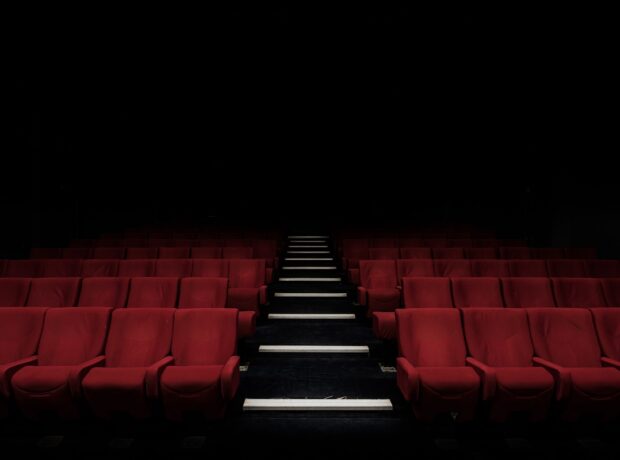Visiting a riverbank in Malaysia, where her grandparents relocated from China because of war, our writer observes her relatives – their food, landscape, language and interactions – and questions her own identity as Malaysian-Chinese and British.
One rock at a time, we step down the makeshift stairs. I hold onto the rope suspended from iron poles that impale the soil and hope that my slipper won’t slip against the stone. Uncle is the first to make it down. He is still as he watches the way the river moves with the earth. When night falls the monkeys will come out to play, along with other creatures, like pythons. That is what Gong Gong’s rifle is for. That and the robbers with their machetes. From behind, Auntie calls to Kang: “Hold on to me, little boy.”
“Yes Mama,” he answers.
Only when I take my last step can I fully hear the motion of the water. It travels steadily, so sure of itself, despite the rocks that protrude from the riverbed. At the sight of them it curves, before continuing its migration.
Uncle calls to us: “Over here!”
He has chosen to settle by the bend of the river where the evergreen bursts from its roots. Looming above him, the trees provide shade from the unforgiving sunlight. That is the thing I have never liked about this place. The way the heat wraps a hand around your throat, then squeezes.
Read More: 7 stories about identity, culture and intersectionality
Auntie has her hand around Kang’s arm as she guides him further down the stairs. Mama balances on the rocks, making her way towards Uncle. She has let Wei Wei come with us.
He has taken his shirt off so that he can wade into the water. He pushes against the current, until the water is lapping at his chest, then looks behind him.
“Come!”
I shake my head.
“Come!”
I shake my head again. “I’ll feed the fishes!”
I run to Mama. She scolds me. “Don’t run, Olive. You’ll fall and hit your head and then you can’t play. Then you’ll be sorry. Where’s the bread?”
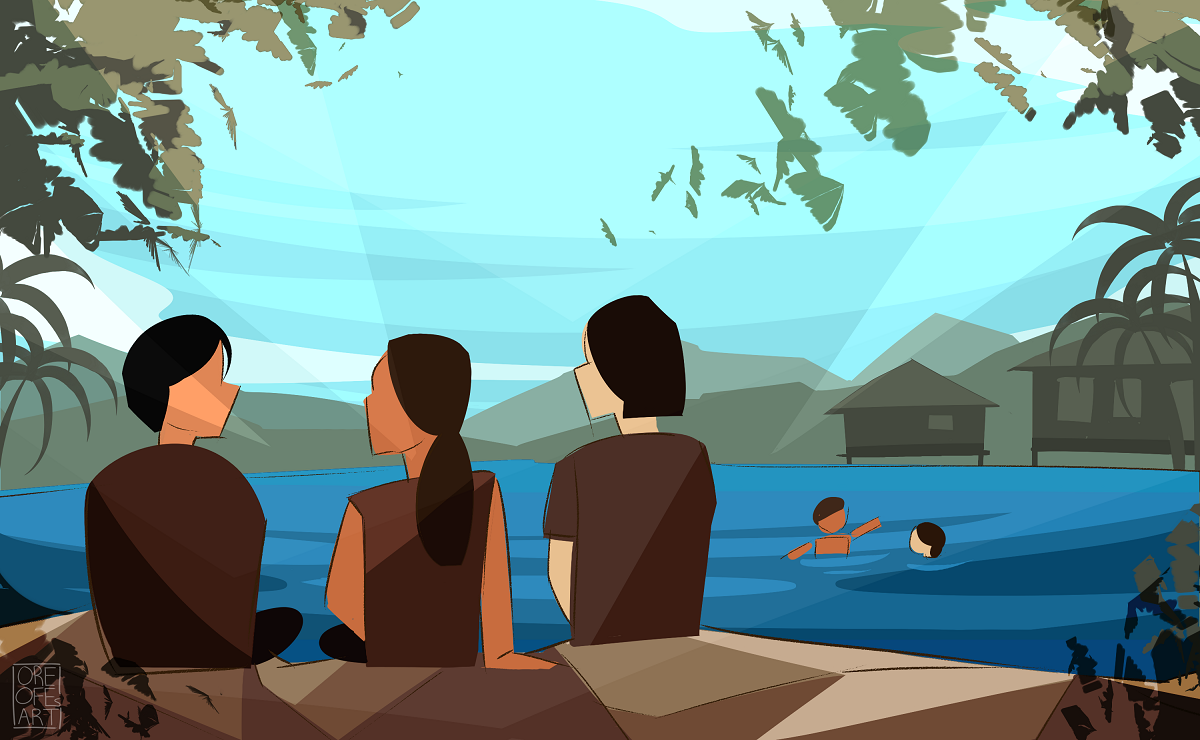
She rummages through the plastic bags they have brought. “Have you put on sun cream?”
“Yes.” Mama speaks to me in Cantonese, but I reply in English.
Grandma and grandpa used to live in China, but they had to leave because of the war. So they came here to Malaysia, and this is where my life began.
“Don’t get any darker. Your aunties will think you’ve come right out of a cave.” She straightens up with a bag of bread and hands it to me. Finally.
“Be careful,” she says. “Don’t go too far.”
I can hear the river running steadily. The moment I have the loaf in my hands, I am watching the fish from the bank. The light bounces off their scales like pennies in a fountain. When a school swims towards me I take several steps back.
“Feed them!” Mama laughs.
I plunge my hand into the bag for a slice of bread to throw. It somersaults into the air, then slams onto the surface of the water. The school darts towards the bread and all the little fish start fighting amongst themselves for it. I reach for another slice but tear this one up into little chunks before tossing it. They never tire of the bread, shooting for the crumbs and then circling back and back for more.
In the distance, shadows are moving through the water. In my own hunger for more, I step into the current. One step at a time until I reach a rock rising from the surface. My fingers grip against it as I haul myself up and perch on the edge.
The bag of bread remains safely under my arm, where I stored it to keep from getting wet. I reach in for another slice, rip and throw. The surface breaks as a shadow snaps from the river. Just like that, the bread is gone. I tear away another chunk, keeping my eyes wide open. I won’t miss another shadow.
By the bank, Kang squeals with delight. He also has bread, which he crushes in his tiny hand so that crumbs rain onto the surface of the water. It is a free for all. It’s as though the river has grown a glistening sheet of armour. All of that light reflecting from their scales.
I gasp when a sudden spray hits my clothes. Wei Wei laughs. “Come! The water is nice!” I gape with disbelief and throw a handful of bread at him. He is now a marked man. The fish fly towards him and he screams with surprise. Fins and tails and scales brushing against him everywhere.
I plunge my hand into the water, waving it frantically to scare the assailants away. As the fish retreat, Wei Wei breathes out a heavy breath. Then his face splits into a grin. He laughs, and it is a rich, full sound.
“If you do not come, I push you in,” he says.
Read More: ‘Coconut woman’: Resolving my ethno-cultural identity crisis
We don’t swim in the river at home. Rivers are for fishing or boating, not for swimming. Only animals swim in the water. But when Wei Wei holds out a hand, I take it and dip one leg in.
Soon, the other joins and I am submerged. Instantly, the humidity melts from my skin, until all I can feel is the chill of the river. It seeps into my bones, shooting straight out to my fingers and down to my toes.
“Good, right?” Wei Wei is still laughing. He lets go of my hand to dip beneath the water, and when he resurfaces, he wipes his face. “Try it!” he says.
We take a deep breath, cheeks puffing out, and let the water wash over us.
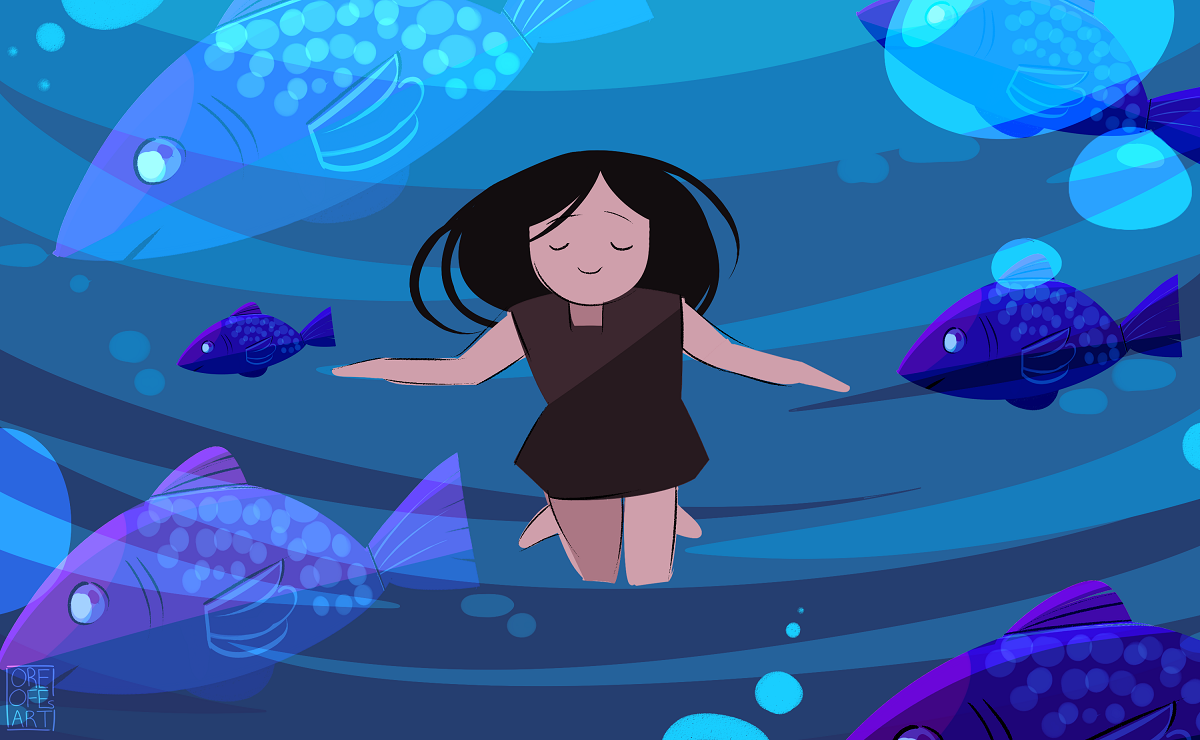
Below the surface, the world is quiet. Time slows and we are not bound by the law of gravity. There’s a gurgle as something whips past my ear. I break the surface and, in the process, I am baptised by the river.
Above us it is as though an egg has cracked in the sky, pouring from its shell a golden yolk. Mama calls for us from the bank. I do not realise how hungry I am until I catch the inescapable scent of soya sauce and garlic. At first it is a mere whisper, the breadcrumbs of an old memory. As we draw nearer, the scent grows pungent, reeling us in and awakening a primal desire.
Mama has set up a barbeque and is now rotating meat speared through skewers. Uncle and Auntie place generous amounts of food on paper plates and distribute them to us before feeding themselves.
I look down at my dish.
“What is this?” I ask, poking an ambiguous-looking morsel of meat with my plastic fork.
Mama looks over her shoulder whilst continuing to tend to the grill. She snorts: “You don’t know what that is?”
“No,” I say, highly aware of how foolish I must seem.
Mama shakes her head. “You’re not Chinese.“
I muster enough courage to say, “So what?”
“You want to be a gwai lou?” Mama says sharply, her eyes narrowed. “A white man?”
It is a trick question, designed to get me into trouble, I’m sure. I sigh heavily though my nostrils. I want to tell Mama that even if I wanted to be a gwai lou they’d never accept me. For them, I am too yellow. Here, I am too white.
“You’d regret it very much if you were a gwai lou, Olive, let me tell you that now,” she continues in Cantonese. “They eat the same thing every day and it’s all very bland.”
“It has taste,” I retort.
“Only because I give it more flavour.”
I roll my eyes. Chinese mothers.
“Look,” Mama says, “it’s pork belly. You know I travelled one hour to get this.”
Auntie gapes. “Didn’t big brother sell it at the market?”
“No!” Mama practically cries. “If he did, I wouldn’t have had to travel so far. Correct or not? So you better eat every last scrap of it.” Then she chuckles. “If you don’t, I’ll have to feed it to the dogs at home and Father will think I’ve finally lost it.”
She pinches her throat and says: “What are you doing feeding that to the dogs? Are you crazy? You think the dogs are like people? You feed them the scraps not a full course meal!”
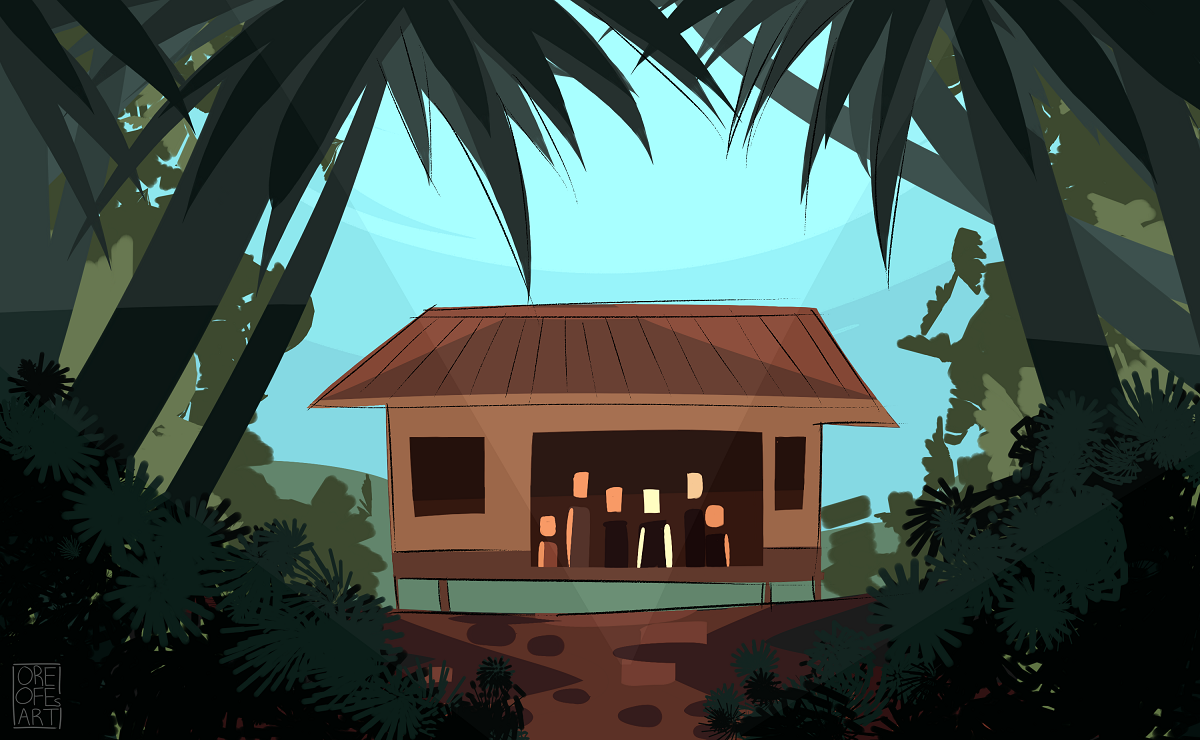
Wei Wei howls with laughter. In the village, he would not be permitted to behave like this; it would be an insult to his elders to laugh at one in this way. But here, we are swallowed by the jungle and what is said will be taken away with the current of the river.
“Wǒ bùyào,” Kang suddenly says. “I don’t want it.”
There are only fragments of Mandarin I can understand. It was the language I spoke every day, before I traded it for English. Now, I pick it up like pieces of a dream I am trying to remember.
Wei Wei and I look at each other, our eyes growing wide at Kang’s disobedience.
“Hey,” Kang’s baba scolds. “Eat it. Auntie worked very hard to get it and you won’t be getting anything this nice for a long time. We can’t afford this kind of meat!”
Kang crosses his arms, imposing what little power he has.
“Eat it,” Uncle says more forcefully. “If you don’t, I won’t let you eat the rest of the day.”
The boy starts crying. “Stop it! Stop crying right now and eat!”
Read More: ‘Tell me everything’: Uncovering my identity in Sri Lanka’s monsoon
Uncle’s voice ricochets off the hills that roll behind the river. I think that someone in the next village will hear his echo. I wish Kang would stop crying so that Uncle will stop shouting. This is not how children are taught at home. He pinches the boy’s ear and yanks hard. Auntie lowers her gaze.
Mama says: “You better eat your food or Father won’t feed you anymore.”
Kang’s crying loudens. His face is red now. Uncle sighs and puts down the spoon. He loosens the fingers clamped to the boy’s ear and smooths it over with his palm. Kang rubs his swollen eyes.
“Come here,” Uncle says. He folds his son into his arms.
“I can’t do this sort of thing,” he sighs. “He doesn’t listen to me. Only his Mother scares him. He thinks I’m joking.” Then he chuckles, rubbing circles on the boy’s back. “It’s better that way. Let his Mother do the discipline. Father can bring back toys and presents.”
Mama scoffs and looks at him scornfully. “All you men are the same. You make the Mothers do all the work and let our children hate us for it.”
Uncle says: “You can’t have two strict parents.”
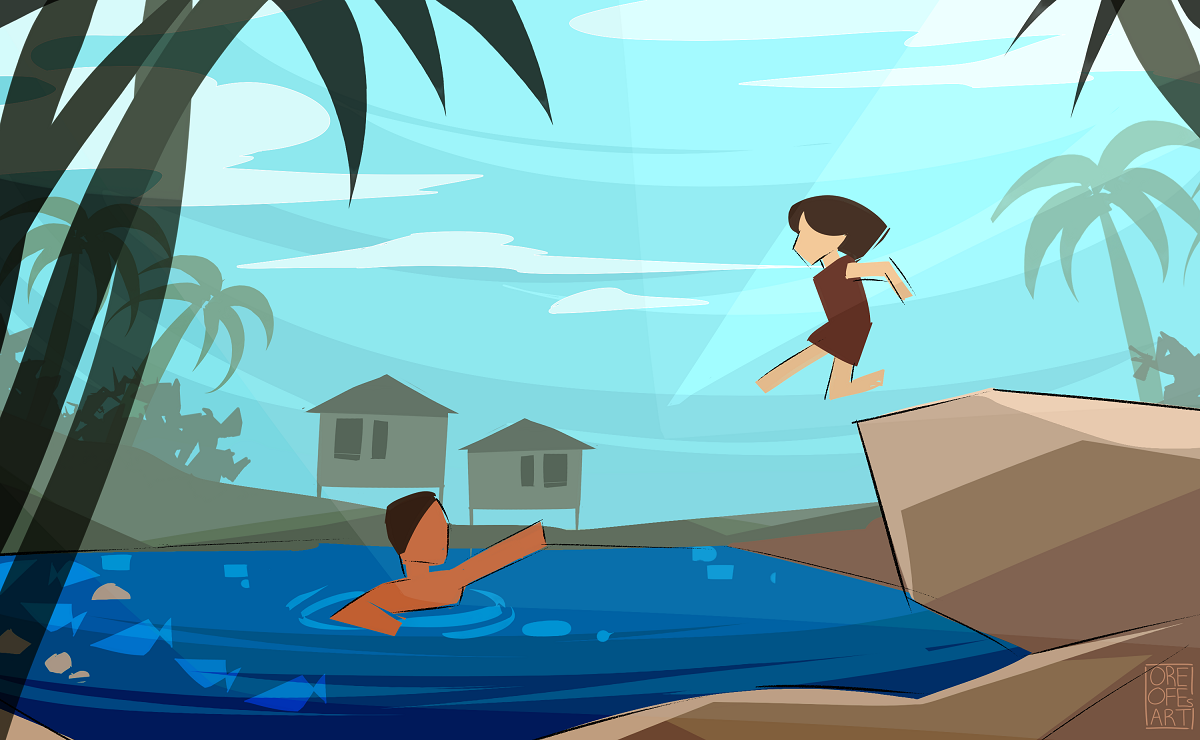
“And you only want to be there for the good times?” Mama snaps. Uncle shrugs. He knows better than to pick a fight with Mama.
I pick at the prawns, attempting to free the flesh from its cage. Seeing my clumsy work, Wei Wei takes one from my fingers and makes quick work of the shell before placing it on my rice.
“You don’t know how to eat?” He asks.
“Mama always does it for me”’ I say.
He nods. It was the same for him too. His Mama taught him how to fish and hunt, how to catch a chicken and break its neck the right way so that it’s truly dead when you bring down the cleaver. The only thing Mama did not teach him was English.
“Why is it so important to you?” I ask when he gives me another prawn.
“Because if you know English, you can do anything. Anywhere. You understand?”
“How can that be?” I ask him.
Wei Wei shrugs whilst fishing a shell from his mouth. He takes it between his fingers and wipes it on his trousers.
“This is the world,” he finally says. “It is like you asking why the sky is blue. It is like your skin.”
I recoil. “My skin?”
“Yes,” he grins toothily so that I can see the meat wedged between his teeth.
“You see your skin?” He holds his arm out against mine to compare. ”It is not like mine. You are like paper. I am like chocolate.” Wei Wei laughs. ‘Why?’
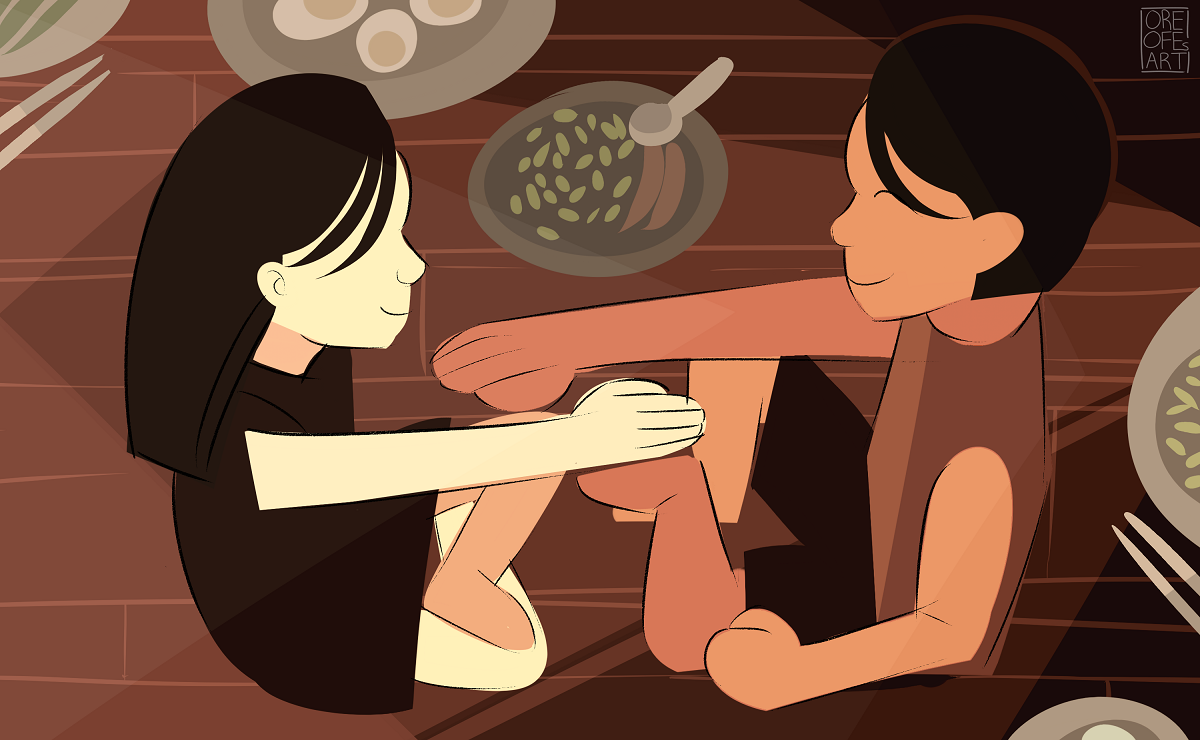
The question confuses me so much that the only thing I can do is laugh with him. ”I don’t know. We are different,” he says, “but the same.”
“We’re the same?”
Wei Wei nods. “I am Chinese, you are Chinese.”
“I’m Chinese,” I say, a little uncertainly.
He nods again. “You are Chinese. You say again. I am Chinese.”
We spend the remainder of the afternoon swimming and taking turns to leap from a rock that juts from a hill. My toes thrust against the dusty surface as I extend my arms so that I am like the birds that migrate from north to south. Then my arms wrap around my knees just as I plunge into the water. Eventually my muscles tire and the pads of my fingertips prune.
I lay on a rock and close my eyes so that there is nothing but the rhythm of the river. Mama is by the bank; the thought tethers me to reality. She will be with Auntie and Uncle, asking them if they remember when they were like me. Young and able- bodied, strong enough to wade against the current and swim for hours. Uncle will laugh and say that because they can no longer do this, their children will do it for them.
Kang will be wading in the shallows of this river that runs like a vein through his little village, scaring himself as the fish fly towards him.
For me, I will be lucky to experience this once a year, if Mama can afford the plane ticket.
As I lie still, my mind wanders home. I try to remember the scent of the pavements after it has just rained, or the flash of red buses on concrete roads that stretch into oblivion. But now it is like trying to remember the scent of your first birthday cake. A stronger scent floods my senses. The aroma of fertile land and the roots nurtured by it. Somewhere a Father ploughs the soil and a Mother feeds her young. This is life in the kampong.
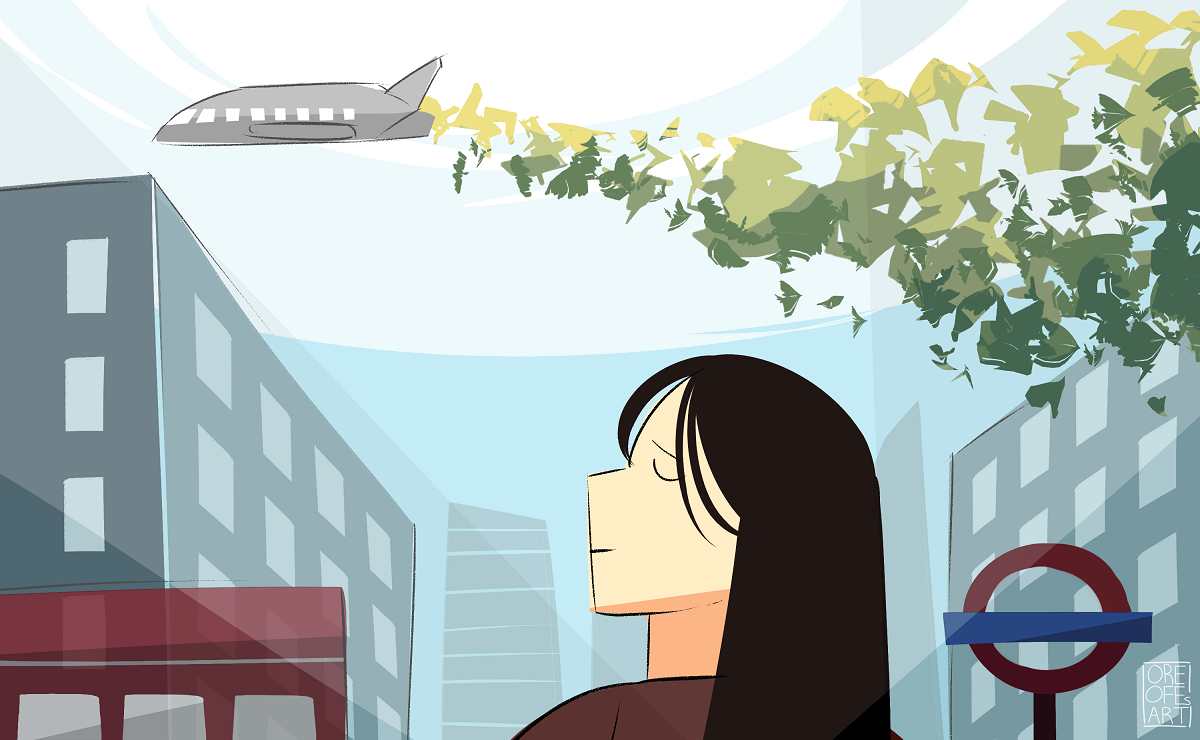
All images by Oreofe Morakinyo.
Read more:
